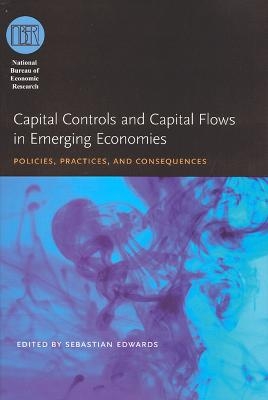
Capital Controls and Capital Flows in Emerging Economies
Policies, Practices, and Consequences
Seiten
2007
University of Chicago Press (Verlag)
978-0-226-18497-5 (ISBN)
University of Chicago Press (Verlag)
978-0-226-18497-5 (ISBN)
- Titel ist leider vergriffen;
keine Neuauflage - Artikel merken
Examines both the advantages and the pitfalls of restricting capital mobility in the emerging nations. This work considers mechanisms that eight countries have used to control capital inflows and evaluate their effectiveness in altering the maturity of the resulting external debt and reducing macroeconomic vulnerability.
Some scholars argue that the free movement of capital across borders enhances welfare; others claim it represents a clear peril, especially for emerging nations. In "Capital Controls and Capital Flows in Emerging Economies", an esteemed group of contributors examines both the advantages and the pitfalls of restricting capital mobility in these emerging nations. In the aftermath of the East Asian currency crises of 1997, the authors consider mechanisms that eight countries have used to control capital inflows and evaluate their effectiveness in altering the maturity of the resulting external debt and reducing macroeconomic vulnerability. This volume is essential reading for all those interested in emerging nations and the costs and benefits of restricting international capital flows.
Some scholars argue that the free movement of capital across borders enhances welfare; others claim it represents a clear peril, especially for emerging nations. In "Capital Controls and Capital Flows in Emerging Economies", an esteemed group of contributors examines both the advantages and the pitfalls of restricting capital mobility in these emerging nations. In the aftermath of the East Asian currency crises of 1997, the authors consider mechanisms that eight countries have used to control capital inflows and evaluate their effectiveness in altering the maturity of the resulting external debt and reducing macroeconomic vulnerability. This volume is essential reading for all those interested in emerging nations and the costs and benefits of restricting international capital flows.
Sebastian Edwards is the Henry Ford II Professor of International Business Economics at the Anderson Graduate School of Management at the University of California, Los Angeles. He is the author or editor of several books, including Preventing Currency Crises, published by the University of Chicago Press.
| Erscheint lt. Verlag | 22.6.2007 |
|---|---|
| Reihe/Serie | National Bureau of Economic Research Conference Report |
| Zusatzinfo | 134 line drawings, 127 tables |
| Sprache | englisch |
| Maße | 162 x 235 mm |
| Gewicht | 1058 g |
| Themenwelt | Wirtschaft ► Volkswirtschaftslehre ► Finanzwissenschaft |
| Wirtschaft ► Volkswirtschaftslehre ► Makroökonomie | |
| Wirtschaft ► Volkswirtschaftslehre ► Wirtschaftspolitik | |
| ISBN-10 | 0-226-18497-8 / 0226184978 |
| ISBN-13 | 978-0-226-18497-5 / 9780226184975 |
| Zustand | Neuware |
| Informationen gemäß Produktsicherheitsverordnung (GPSR) | |
| Haben Sie eine Frage zum Produkt? |
Mehr entdecken
aus dem Bereich
aus dem Bereich
eine Einführung in die Staatsfinanzen
Buch | Hardcover (2024)
Vahlen (Verlag)
CHF 55,70
New Foundations
Buch | Softcover (2022)
Edward Elgar Publishing Ltd (Verlag)
CHF 89,95


